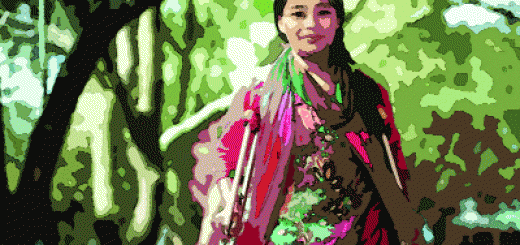Tagore and I Kazi Falguni Eshita
Recently, I was watching a musical show aired at one of the Bangla channels to mark Rabindranath Tagore’s death anniversary. Here in the USA, I miss being with Tagore every single minute. Yes, there might be a lot of trumpets, tubas or pianos everywhere, but a harmonium beside a pair of tabla-bia (the traditional drums that accompany the harmonium) is a very rare sight indeed.
American life might offer a lot of options far superior compared to Bangladesh; but nothing can ever be a substitute of that soothing pleasure to my ears, the comfort of a properly sung Tagore song. I am not against the recent trend of doing remix of Tagore songs, but sometimes, while doing remix; people tend to blend the tunes and notes in such a way, that the main zest becomes completely eliminated. For example, the rendition of Mayabono Biharinisung by Somlata for a certain Indian Bengali film, seems soothing to the ears, yet, because of the overwhelming use of instruments, it sounds a tad bit odd to me.
When I was just a tiny tot, (a little less than 5 years old), I was introduced to an amazing form of language, the fascinating world of Tagore songs. I grew up listening to my maternal grandmother, one of my siblings and occasionally, my mom too. With three members of my family singing, it did not take long for the seed of Tagore songs to become a huge tree inside my heart. Voices of well-known singers like Rezwana Chowdhury, Sadi Mohammad and Hemant Mukherjee became an inseparable part of my daily life.
While doing a four-year long certificate course in Tagore song from Bulbul Academy of Fine Arts, I had to go from the top to the bottom of Geetobitan. Loads of research had to be done for the theoretical part of the course. During that time, I came across dance dramas like Chitrangada and Mayar Khela. Chitrangada is one of my most favorite characters. This drama portrays that only physical beauty does not define the word “woman.” Skills like archery and qualities like courage and boldness can also symbolize beauty. Chitrangadaalso shows how much a woman can do for the one she truly loves.
Many of the popular Tagore song tracks are inspired by western music. Scottish folk, English classical, or even church choirs inspired Tagore to write many well known songs like Aha aji e Basante (Go where glory Waits thee) or Phule phule dhole dhole (Ye banks and Braes ‘O Bonnie Doon). Now I’m actually trying to learn these songs along with the original western tracks. Don’t know how far I’ll succeed, though.
For me, American Literature does not have the ability to provide an inspiration to write, the way a story in Golpo Guccho can. I was in the 9th grade when I got Golpo Guccho as a rapid reader in Bangla class. I was amazed to see how Tagore could turn the simplest daily life into something extraordinary. The various genres, themes and characters stuffed inside one short story collection seem applaudable. This collection has all the genres, from supernatural to romantic, it can satisfy all kinds of readers. I also have read other works of Tagore like Shesh er Kobitaor Noukadubi. The novels did not attract me the way those short stories did, though.
Moreover, I came across many of Tagore- related films, his paintings, letters and many other articles. Tagore had experienced different types of heartbreaks, like losing his beloved daughter Bella to pulmonary tuberculosis, a fatal disease without any cure at that time. As a result, he composed many literary masterpieces; which not only talked about death, but also showed ways to convert grief into strength.
Us Bengalis get introduced to Tagore by getting some of his creations as part of our Bangla textbooks. I still remember reading poems like Amader Choto Nodi or Bir Purushback in first grade. I could easily visualize the scenes described in the verses.
Learning Tagore can seem really boring at first, but his creations are bound to attract you if you really understand him. After all, he not only composed the national anthems of both Bangladesh and India; but he was also the first Bengali to win a Nobel Prize in literature. As a Bengali, I am always thankful to Tagore for sharing his amazing creations with us. Even after 150 years of his birth, we still remember him, for his creations. Salute, Tagore!














Recent Comments